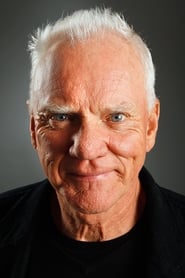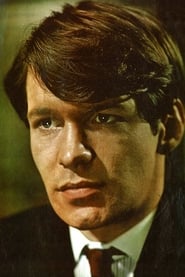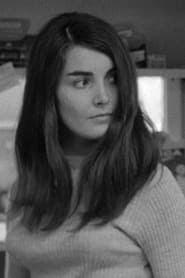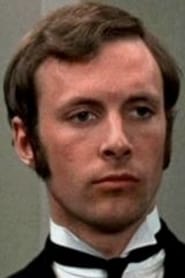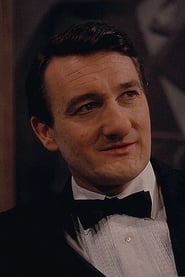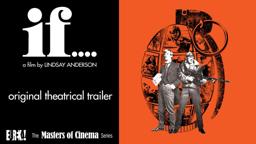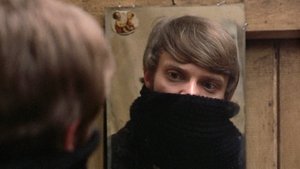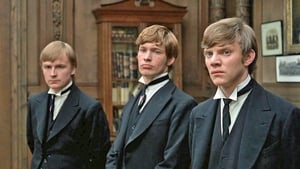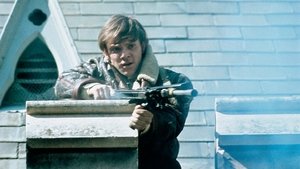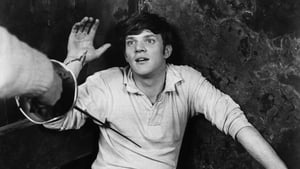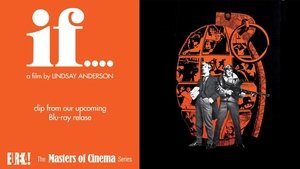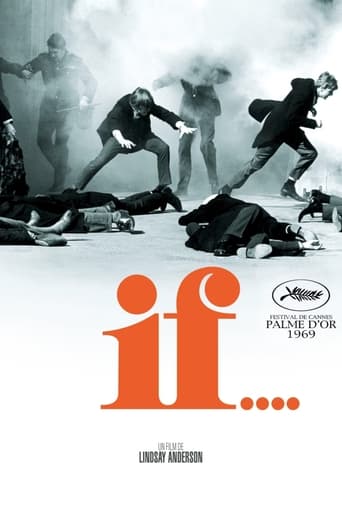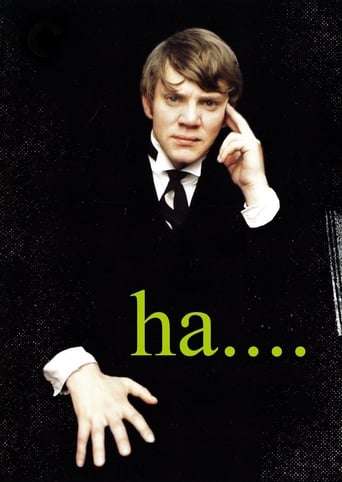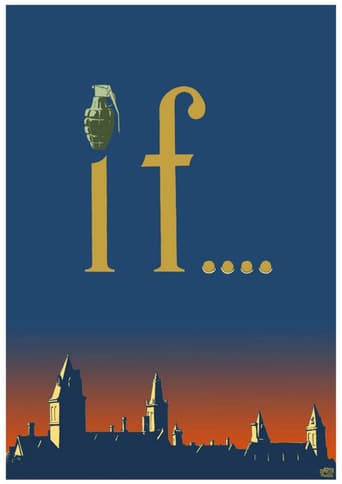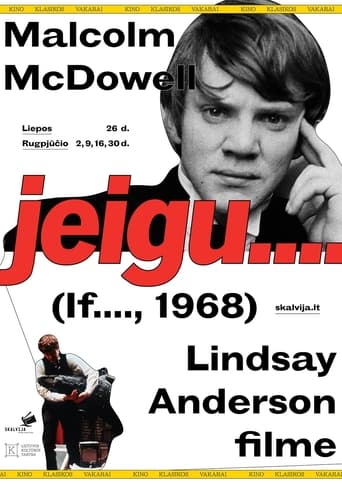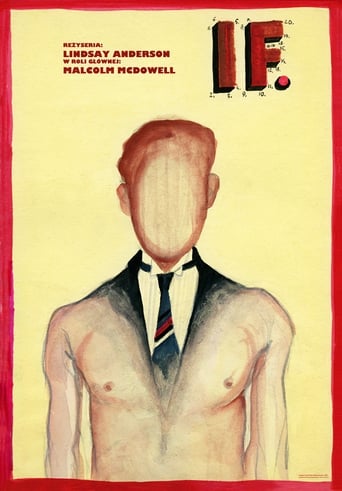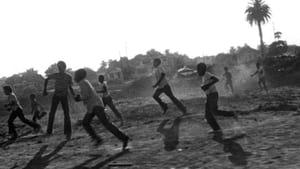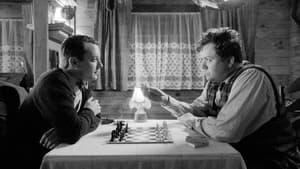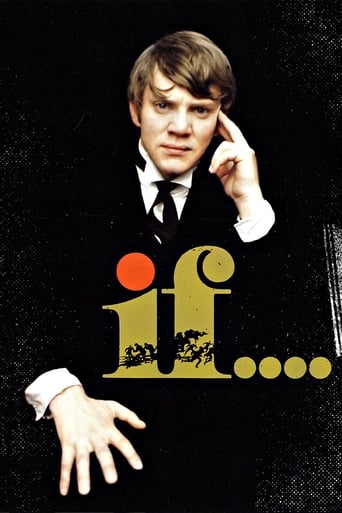
if....
Which side will you be on?
1968 | 112m | English
Popularity: 1 (history)
| Director: | Lindsay Anderson |
|---|---|
| Writer: | David Sherwin, John Howlett |
| Staring: |
| In an English boys' boarding school, social hierarchy reigns supreme and power remains in the hands of distanced and ineffectual teachers and callously vicious prefects in the Upper Sixth. Three Lower Sixth students, Wallace, Johnny and leader Mick Travis decide on a shocking course of action to redress the balance of privilege once and for all. | |
| Release Date: | Dec 19, 1968 |
|---|---|
| Director: | Lindsay Anderson |
| Writer: | David Sherwin, John Howlett |
| Genres: | |
| Keywords | revolution, private school, british empire, rebellion, social satire, rebellious youth, gun violence, british youth, school shooting, boys' boarding school, british school system, radical politics, free cinema, student revolt, youth revolts, university school |
| Production Companies | Paramount Pictures, Memorial Enterprises |
| Box Office |
Revenue: $4,600,000
Budget: $500,000 |
| Updates |
Updated: Feb 01, 2025 Entered: Apr 13, 2024 |
| Name | Character |
|---|---|
| Malcolm McDowell | Mick Travis |
| David Wood | Johnny Knightly |
| Richard Warwick | Wallace |
| Christine Noonan | The Girl |
| Rupert Webster | Bobby Phillips |
| Robert Swann | Rowntree |
| Hugh Thomas | Denson |
| Michael Cadman | Fortinbras |
| Peter Sproule | Barnes |
| Peter Jeffrey | Headmaster |
| Anthony Nicholls | General Denson |
| Arthur Lowe | Mr. Kemp |
| Mona Washbourne | Matron |
| Mary MacLeod | Mrs. Kemp |
| Geoffrey Chater | Chaplain |
| Ben Aris | John Thomas |
| Graham Crowden | History Master |
| Charles Lloyd Pack | Classics Master |
| Guy Ross | Stephens |
| Robin Askwith | Keating |
| Richard Everett | Pussy Graves |
| Philip Bagenal | Peanuts |
| Nicholas Page | Cox |
| Robert Yetzes | Fisher |
| David Griffin | Willens |
| Graham Sharman | Van Eyssen |
| Richard Tombleson | Baird |
| Robin Davies | Machin |
| Brian Pettifer | Biles |
| Michael Newport | Brunning |
| Charles Sturridge | Markland |
| Sean Bury | Jute |
| Martin Beaumont | Hunter |
| Ellis Dale | Motorcycle Salesman (uncredited) |
| John Garrie | Music Master (uncredited) |
| Tommy Godfrey | School Porter (uncredited) |
| Peter Jaques | Schoolmaster (uncredited) |
| Simon Ward | Schoolboy (uncredited) |
| Name | Job |
|---|---|
| Lindsay Anderson | Director |
| David Sherwin | Screenplay |
| Ian Rakoff | Assistant Editor |
| John Howlett | Writer |
| Betty Blattner | Makeup Artist |
| Christian Wangler | Sound Recordist |
| Brian Eatwell | Art Direction |
| Allan McKeown | Hairstylist |
| Alan Jones | Assistant Sound Editor |
| Jocelyn Herbert | Production Design |
| Dave Maiden | Sound Effects |
| Marc Wilkinson | Original Music Composer |
| David Gladwell | Editor |
| Miroslav Ondříček | Director of Photography |
| Chris Menges | Camera Operator |
| Name | Title |
|---|---|
| Roy Baird | Executive Producer |
| Lindsay Anderson | Producer |
| Michael Medwin | Producer |
| Albert Finney | Producer |
| Organization | Category | Person |
|---|
Popularity History
| Year | Month | Avg | Max | Min |
|---|---|---|---|---|
| 2024 | 4 | 19 | 35 | 12 |
| 2024 | 5 | 24 | 49 | 14 |
| 2024 | 6 | 29 | 43 | 14 |
| 2024 | 7 | 36 | 49 | 20 |
| 2024 | 8 | 22 | 37 | 10 |
| 2024 | 9 | 14 | 23 | 7 |
| 2024 | 10 | 11 | 21 | 6 |
| 2024 | 11 | 11 | 22 | 7 |
| 2024 | 12 | 11 | 19 | 6 |
| 2025 | 1 | 11 | 18 | 6 |
| 2025 | 2 | 8 | 13 | 3 |
| 2025 | 3 | 5 | 10 | 1 |
| 2025 | 4 | 1 | 1 | 1 |
| 2025 | 5 | 1 | 1 | 1 |
| 2025 | 6 | 1 | 1 | 1 |
| 2025 | 7 | 1 | 1 | 0 |
| 2025 | 8 | 1 | 1 | 0 |
| 2025 | 9 | 2 | 2 | 1 |
| 2025 | 10 | 2 | 4 | 1 |
| 2025 | 11 | 3 | 4 | 2 |
| 2025 | 12 | 3 | 7 | 0 |
| 2026 | 1 | 1 | 1 | 0 |
Trending Position
Released in 1968, directed by Lindsay Anderson with a screenplay by David Sherwin, <i>If....</i> is a story of three non-conformist schoolboys played by Malcolm McDowell, Richard Warwick and David Wood, who plot revenge. Organized as a series of tableaux separated by title cards, IF... spends its fi ... rst half depicting the harsh rules that these boys live under at their elite public school, and the arbitrary punishments given out by senior boys, headed by the sinister Rowntree (Robert Swann) and the distant school officials. This is all in an environment of bizarre old rituals, Latin refrains, and hardly more intelligible English public school slang (and of course, it wouldn't be a classic story of British public school life without some innuendo about buggery.) In the second half of <i>If....</i>, as the storytelling takes on an increasingly surreal tone where we question what is real and what is fantasy, the boys and a girl from town get their hands on weapons and ultimately commit a massacre. The 1960s was a time of war in Vietnam (and other violent conflicts brought to viewers globally by the media) and youth uprisings in the United States and France. Plus, these elite British school also featured compulsory military drill. In <i>If....</i>, the walls of these boys' dormitory is covered with magazine cutouts of war photographs, as if to say that in a violent world, it is no surprise if the young too made recourse to violence. In this respect it feels very much like a precursor to Aki Kaurismäki's <i>The Match Factory Girl</i>. <i>If....</i> also reflects the new sexual freedom of 1960s Britain, and the frustration kindled in these young men who see such open sexual expression in magazines and town streets but cannot have any of it. There are a number of films from this era that document the rise of a counterculture and more open attitudes, but few are as sympathetic to these young people as this film of Anderson and Sherwin. The only serious flaw of <i>If....</i> is that the main actors are too old to convincingly play teenagers, being in their mid 20s at the time of shooting. Imagine how much more shocking the film would be if it were real sixth-formers acting, though I suppose the (few) sex scenes made this impossible. Still, <i>If....</i> is deservedly a classic.
At a posh private school there is an hierarchy that sees the housemaster exercise rather arbitrary authority through his three "whips". It's usually the younger pupils they like to terrorise, but at this school there are three older men who attract their attention. There's "Mick" (Malcolm McDowell), ... "Johnny" (David Wood) and "Wallace" (Richard Warwick) and led by the former, they have little interest in conforming with the expectations of the establishment. Amidst this culture of bully or be bullied, there is also some military training provided and it's this that sparks an idea of a more direct form of rebellion - and when better to implement their plan than at a high ceremonial with an HRH and an army general in attendance. McDowell is at his malevolently mischievous best here as he exudes a spirit of belligerent bloody-mindedness that shines quite a light on the toxic atmosphere at a place of learning where individuality was distinctly frowned upon. That's not just individuality of thought and mind, but there are also asides made to sexuality as "Wallace" has a lot less interest in their new friend from the tea bar (Christine Noonan) and she has quite a bit more enthusiasm for "Mick". Though the brutality of the daily behaviour isn't explicitly displayed, there's little left to our imagination and by the end it's quite clear that writer David Sherwin is taking a swipe not just at the privilege on display here, but about the broader societal attitudes to class rather than merit. There's a fairly solid array of supporting effort on display here, too, with many characterisations firmly propping up the out-dated notions of perpetuating the status quo and inherited entitlement that help this thought-provoking story stand out.
